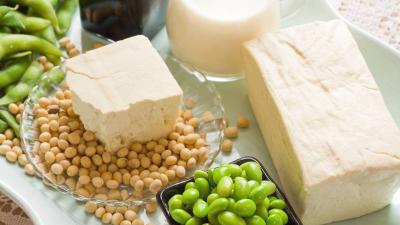Jazz Tofu

Soy products are protective. They reduce the likelihood of getting cancer, and, for women previously diagnosed with breast cancer, they reduce the odds that cancer will ever come back.
On Saturday night, I was at Washington’s Blues Alley to hear Chris Thomas King. In the great tradition of blues singers and guitarists with the same surname, CT is one of the best.
Blues Alley’s menu features dishes named for jazz greats: Dizzy Gillespie’s chicken, ham, and sausage jambalaya, Joe Williams’ stuffed pork chops, Maynard Ferguson’s Cajun chicken, and Sarah Vaughn’s filet mignon.
I ordered Ahmad Jamal’s signature vegetarian Creole rice, made with sautéed Cajun-spiced tofu, onions, celery, carrots, red peppers, and asparagus with Creole seasoning, served over rice.
“Are you sure want it?” the server asked. “It’s tofu.”
I asked what she meant. “It’s made from soybeans,” she said, and she went on to explain that soybeans are processed.
“Have you seen how they process chickens?” I asked gently. The conversation drifted from “tofu is weird” to the oft-repeated myth that “soybeans have estrogens that can cause cancer.” Whether the myth has been kept alive by the dairy industry or simply by Web trolls, it has been remarkably persistent. And in case your friends—or restaurant server—have subscribed to the same misimpression, let’s have a quick review.
First of all, tofu is not weird. It is a centuries-old Asian traditional food. Straight out of the package, it has loads of protein, but essentially no taste—the vegan equivalent of egg white. But marinated, grilled, baked, or added to stir-fries, it is delicious and quickly becomes a favorite.
Many years ago, researchers found that soybeans—like many plants—contain natural isoflavones, whose chemical structure is somewhat similar to human steroid hormones, like testosterone or estrogens, leading some to speculate that soy products might have hormonal effects—increasing cancer risk in women, for example.
Over the years, these biological issues have been studied in detail. And in 2008, eight prior studies conducted in Asians and Asian Americans were combined in a meta-analysis.1 The populations were selected because they have a very wide range of soy intake, from almost none to very high. It turned out that, instead of soy products causing cancer, they appeared to help prevent it. Women with the highest soy intake—including soy milk, tofu, and similar products—had 29 percent less risk of breast cancer, compared with women who generally skipped soy. By 2014, 35 studies were summarized in a new meta-analysis, showing that women eating the most soy products had a 41 reduction in the risk of breast cancer.2
In 2012, the American Journal of Clinical Nutrition published a different kind of study.3 This time, the focus was on women who had had breast cancer in the past. The question now was whether tofu, soy milk, or other soy products would affect the likelihood of cancer coming back.
And it did. Drawing on a total of 9,514 women previously treated for breast cancer, those who consumed the most soy had about a 30 percent reduction in the risk of cancer recurrence.
In other words, soy products are protective. They reduce the likelihood of getting cancer, and, for women previously diagnosed with breast cancer, they reduce the odds that cancer will ever come back.
That said, a healthy plant-based diet is not the soybean cheerleading club. Soy is not essential. The key nutritional theme to remember is that vegetables, fruits, beans, and whole grains are healthful, and you can have tofu or not. But soy products are extremely versatile and are far healthier than burgers, milks, and cheeses they replace. And they may well have health benefits of their own.
Fifteen minutes later, the server brought Ahmad Jamal’s signature dish. And the vegetarian Creole rice—tofu and all—turned out to be delicious.
By the way, Joe Williams died at age 79, Maynard Ferguson at 78, Dizzy at 75, and Sarah Vaughn at 66. At age 85, Ahmad Jamal is not only still with us; he has released two new records in each of the last two years. Credit the tofu, if you like.
References
- Wu AH, Yu MC, Tseng CC, Pike MC. Epidemiology of soy exposures and breast cancer risk. Br J Cancer. 2008;98:9-14.
- Chen M, Rao Y, Zheng Y, et al. Association between soy isoflavone intake and breast cancer risk for pre- and post-menopausal women: a meta-analysis of epidemiological studies. PLoS ONE. 2014;9:e89288.
- Nechuta SJ, Caan BJ, Chen WY, et al. Soy food intake after diagnosis of breast cancer and survival: an in-depth analysis of combined evidence from cohort studies of US and Chinese women. Am J Clin Nutr. 2012;96:123-132.







